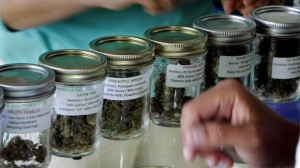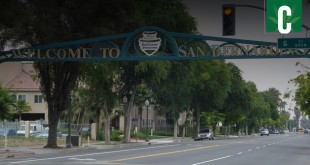Bankrupt and swamped with illegal medical marijuana dispensaries, the City of San Bernardino is turning to a promising solution: more weed.
 City officials are considering a move to legalize, regulate, and tax pot shops in town. Dispensaries are currently banned under city ordinance, though medical pot is allowed statewide in California.
City officials are considering a move to legalize, regulate, and tax pot shops in town. Dispensaries are currently banned under city ordinance, though medical pot is allowed statewide in California.
The new approach was prompted by worries about the illegal dispensaries that dot the city. There hasn’t been enough money to enforce the rules banning those shops, so officials are looking to re-legalization as a source of tax revenue.
A few legal pot shops, in other words, would make it easier for the city to shut out all the illegal operations.
San Bernardino isn’t the first city to see marijuana in a new light after years of political attacks on the industry. Other California locales increasingly see pot as a way to fund struggling programs, including law enforcement.
“This is a no-brainer,” said Karen O’Keefe, director of state policies for the Marijuana Policy Project’s California office. “More and more people are realizing that you’d really have to be in the Stone Age to oppose this.”
City Attorney Gary Saenz said the San Bernardino City Council has formed a legislative review panel to research the proposal. As of early July, the group was gathering data, looking at laws in other communities, and coordinating with police.
A final report will be brought to the panel before it would move to the city council for a possible vote. At least two more public meetings will be held in August to discuss the idea.
“We are in the exploratory phase,” Saenz said. “My primary objective is to close down the seedy shops.”
The city typically has as many as 20 illegal shops operating on any given day, Saenz said. Allowing some shops is one way to crack down on the others, he said.
“We have in this city a proliferation – and a lot of cities in California are experiencing it – of illegal medical marijuana dispensaries,” Saenz said. “These people are defiant and they are opening up these things right and left.”
California voters legalized medical weed in 1996 when they passed the Compassionate Use Act at the polls. Ever since, MMJ in the state has been mired in chaos.
Thousands of unregulated shops have opened across the state. Over the past few years, a growing number of communities have banned dispensaries on the local level, backed by a Supreme Court decision last year.
 The recognition by municipalities such as San Bernardino that banning all weed may not work in the public’s favor could mark a major turning point for medical pot in California – if not immediately, not far down the road, either.
The recognition by municipalities such as San Bernardino that banning all weed may not work in the public’s favor could mark a major turning point for medical pot in California – if not immediately, not far down the road, either.
James Mulvihill, a city council member, said he decided to support the proposal after learning the city spends $10,000 every time it tries to take down an illegal pot dealer. Tax revenue from legitimate shops would go only toward enforcement of MMJ regulations, Mulvihill said.
“I think we are making the right steps,” he said. “It’s been a hot issue. Prohibiting them is obviously not working. It’s almost easier to regulate it than prohibit it.”
 California Marijuana Market Breaking "Marijuana News" from CA
California Marijuana Market Breaking "Marijuana News" from CA




